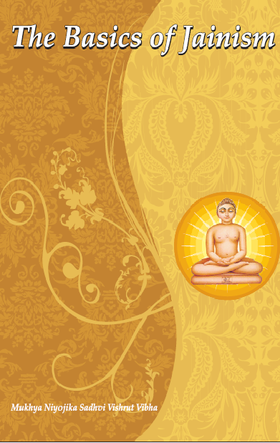Non-absolutism (anekatvada) is a unique and special contribution of Jainism to the philosophical world. Anekanta is the basic attitude of mind which expresses the fundamental principle that reality is complex and it can be looked at from different points of view.
Syadvada is the pattern of communication based on doctrine of non-absolution. It is formed of two words 'syad' and 'vada'. Syad is very often understood as 'doubt' or 'perhaps'. But in this context it does not express doubt or any sort of uncertainty. It refers to a point of view in a particular context or in a particular sense. Vada means predictions. Syadvada means a theory of prediction of the description of reality from different points of view, in different contexts.
According to Jain philosophy, unity and diversity are both real. Both are related. Unity without diversity and diversity without unity is unreal. Each and every object in this world has infinite properties. They have related significance. All these properties can be comprehended only with reference to context. No property, whatsoever, can be delineated absolutely.
The whole truth about a particular object can be comprehended, but it cannot be communicated. At any given time, we can only describe one of the properties of a substance. It is wrong to assert a thought with certainty, because every utterance of ours is from a particular point of view. With a certain standpoint, we can comprehend only one aspect and not all the infinite aspects, which each and every object has by nature. Let us take the example of a person. He is a writer, orator, poet and a professor. All these qualities abide in one person only. But they are all relative truths. When we say that he is a teacher, we comprehend his teaching capacity and designate him as a good teacher. But when we say that he is a writer, his teaching capacity is not comprehended, but his writing talent is taken into consideration. Likewise all the qualities of a person, when expressed in words, are relative expressions.
A person is a father to his son, son to his father, brother to his sister and nephew to his uncle. He is a pupil to his teacher and teacher to his pupils. He is of multitude relations and qualities. But they all depend upon different viewpoints.
Truth is infinite. It can only be apprehended through infinite standpoints. Theoretically, this theory has helped a great deal in ascertaining the truth about certain substances. Jain thinkers adhered to this theory, which is technically called 'syadvada', in expressing their attitude towards the fundamental realities of the world.
Anekanta states that the nature of reality should be considered and studied purely from the rational point of view without prejudices. In olden style of churning, a milkman churns the buttermilk, and while churning, he pulls the string on one side and loosens the string on the other. The consequence is that butter is extracted from the buttermilk. Similarly, if we look at different points of view of knowing reality in their proper prospective, considering the primary points of view as important and secondary points of view with their due consideration, truth can be understood in the true prospective and in a comprehensive way.
Anekanta offers a theory that every object in this world is a synthesis of the attributes of permanence and change. If we consider the object from the point of view of 'substance' it is permanent, if we consider it from the view of modes it is not permanent. For example, 'Jiva' is a substance which is permanent, yet its different states or modes as man, lower animal or birds are not permanent. Thus modes originate and are destroyed but the substance (Jiva) is permanent.
Lord Mahavira said, "Comprehend all aspects of an element from different viewpoints. Truth is relative, it cannot be comprehended absolutely. One, who desires to comprehend one aspect of an element by neglecting all the other infinite aspects of it, can never know that particular aspect in reality. Such comprehension will only offer a half truth."
All our day-to-day activities abide by this law of nature. Nobody can transgress its boundary and claim to be a votary of the truth. This relativity of viewpoints has paved the way for co-existence and reconciliation of all contradictory attributes. It has created an atmosphere of tolerance, and as such, obstinacy is automatically eradicated. Lord Mahavira said, "Do not distort the thought of others. Try to understand them in their due perspective. No utterance is untrue when it is considered in the context in which it is uttered. This will lead to light. The tug-of-war between divergent views will come to an end and the way to reconciliation will become clear."
This theory of ' Anekantavada' or 'Syadavada' certainly has its application in day-to-day life. If it was only a theory of philosophical importance, it would have lost its practical utility. Principles which are not applicable in our day-today lives have no significance whatsoever.
In brief, 'Syadvada' is the method of understanding another's viewpoint, from a correct perspective. This attitude paves the way for tolerance. This ultimately leads to the reconciliation of opposing views and creates an atmosphere of harmony and peace.
